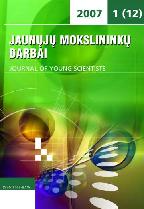Agresyvių vaikų socializacijos teoriniai pagrindai
Theoretical Basis of Aggressive Children Socialization
Author(s): Nijolė Bražienė, Daiva MockienėSubject(s): Social Sciences
Published by: VšĮ Šiaulių universiteto leidykla
Keywords: Children’s aggression; socialization; aggression prevention.
Summary/Abstract: Children’s aggression against children is an urgent, dangerous problem in Lithuania and absolutely uncontrolled. European scientists not discount the premise that pre-schoolers with aggressive behaviour in early adolescence tend to offend much more often than their peers without aggression in childhood. Pedagogues of pre-school establishments are not always able to assess adequately behaviour of their inmates neither know what to do in a given situation. These facts describe practical urgency of insufficient scientific work. Aim of the article: to analyse aggressive behaviour manifestations in kindergarten inmates and the need for information about exceptional children’s behaviour correction and prevention, preparing as a compensation a summary of “Theoretical Basis Of Aggressive Children Socialization”. Studies of European and Russian scientists were based upon it. It was established that there is a process called aggression socialization, with the help of which the child is accustomed to control his/her inadequate behaviour with social requirements and trained to accommodate to the expectations of other people. Staff of pre-school institutions can mostly influence by shaping suitable relations in the dyads “child-adult”, “child-child” as well as positive attitude towards him/herself. Scientists stress three main directions for aggression prevention: training of self-adjustment ways, communicative skills and empathy. Close co-operation between the teachers and doctors is noted. In order to realize expedient effect, general pedagogical and special training methods are recommended, the latter (games, topical conversations, drawing, role-playing situations, sand, water, soft materials, tale therapy, etc.) need extra pedagogical and psychological preparation.
Journal: Jaunųjų mokslininkų darbai
- Issue Year: 2008
- Issue No: 2(18)
- Page Range: 55-64
- Page Count: 10
- Language: Lithuanian

